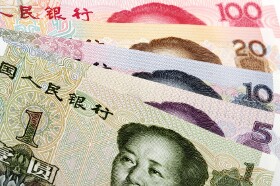The Chinese yuan is ignoring negative market sentiment on Tuesday, despite a myriad of warnings pertaining to the national economy. Beijing has experienced a significant slowdown in recent months, stemming mostly from the US-China trade war. Even though it looks like both sides are inching towards a new trade agreement, there is still growing pessimism regarding growth.
As investors home in on a potential trade deal, there is another key facet to growth for the worldâs second-largest economy: government stimulus.
Beijing has unleashed new stimulus measures in recent months to spur growth. In addition to conventional forms of economic stimulus, the federal government is also trying across-the-board tax cuts, credits for consumers to spend again, and reductions in the reserve requirement ratio to encourage bank lending. Experts say that this will be the only way to turn around the economy, should trade talks collapse.
Infrastructure will ostensibly play a key role in stimulating the economy.
According to the National Development and Reform Commission (NDRC), the nationâs top economic planner, the government is anticipated to approve $220 billion worth of infrastructure projects this year. Transportation will be dominating the stimulus spending, with most of the funds being allocated to public transportation and railway projects, like the Shanghai Urban Rail Transit expansion and the Intercity Rail Network in Eastern Guangdong.
Will taking on more debt reverse the slowing trends? Not quite, says JPMorgan Chase in a research note. The Wall Street giant warned that skyrocketing debt â public and private â threatens growth.
The biggest concern regarding financial stability and the sustainability of economic growth has been China’s ballooning debt problem, especially in the corporate sector.
Another major risk to the economy is the increase in the number of so-called state-owned zombie companies. The financial institution notes that the Peopleâs Bank of China (PBOC) may need to implement subzero interest rates to ensure the economy does not slump even further.
That said, Zhiang Xin, a female billionaire and the CEO of Soho China, does not expect an economic collapse, but she conceded that it is imperative to monitor the US-China negotiations.
Right now, because the trade talks has not quite reached an agreement yet, so the sentiment in China is relatively weak. I think the sentiment matters a lot. And an economy is about sentiment, economy is about confidence.
What we felt was that it was hard to get lending, borrowing from the banks. And then I think the numbers got so bad, by the fourth quarter, the central banks came out with a different policy, reversed that.
The USD/CNY currency pair was unchanged at 6.7448 at 18:19 GMT on Tuesday. The EUR/CNY slipped 0.4%, from an opening of 7.7252.
If you have any questions, comments or opinions regarding the Chinese Yuan,
feel free to post them using the commentary form below.
